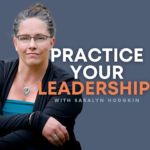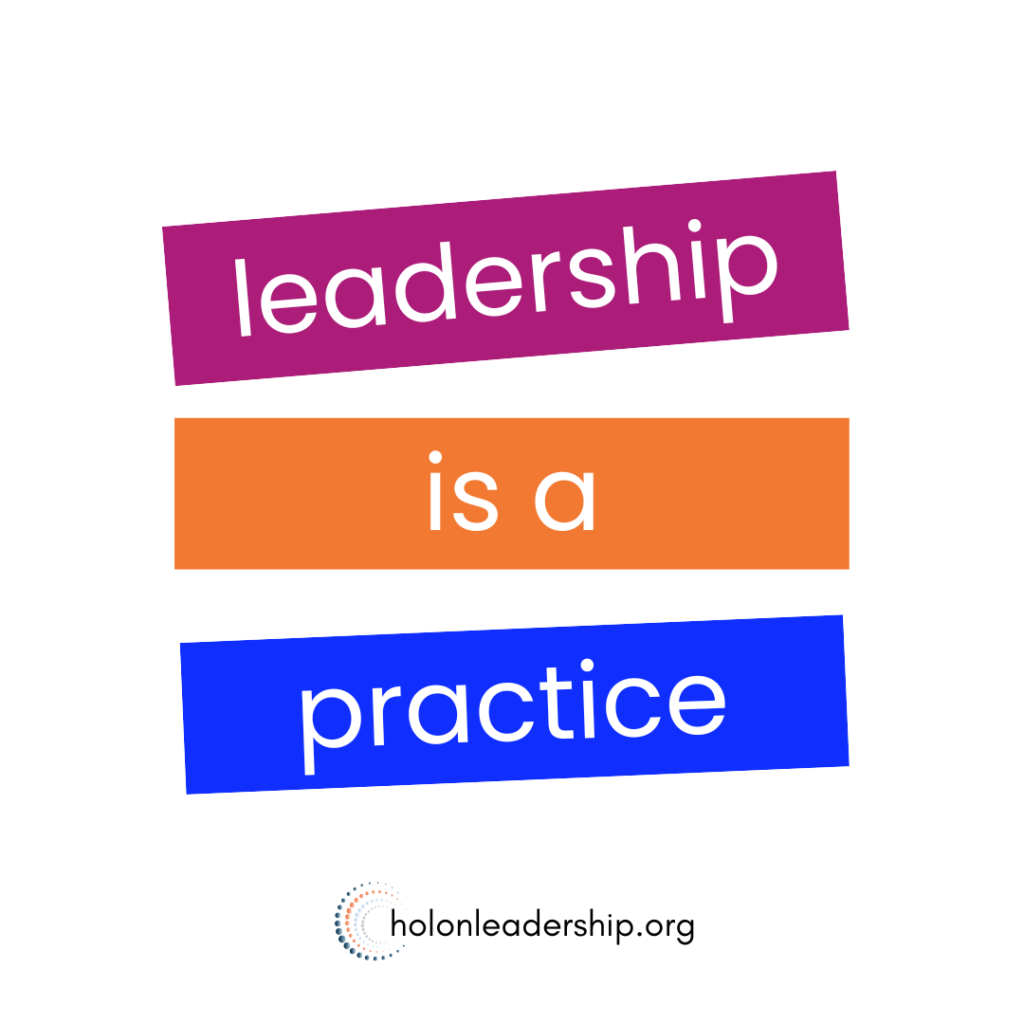72. Listen to Yourself
With so much advice swirling around leadership and growth, it’s easy to feel stuck. But sometimes, the best thing we can do is pause and listen to our own intuition.
In this episode, we share practices that will help you cut through the noise and stay grounded, like managing negative thoughts, taking conscious risks, celebrating wins, understanding the seasons of your life, and getting clear on your essential leadership practices.

Listen on
Resources
- Subscribe to our newsletter for monthly community exclusive worksheets
- Follow us on Instagram and LinkedIn for more free resources
Transcript
Transcript is AI auto generated. Please excuse any typos.
Hi everyone. I’m Saralyn Hodgkin, and this is the podcast to practice your leadership.
Hi folks. So I’m looking at all these thoughts and ideas of what to talk about, what to share, and I gotta like, I know I’ve said it before, but man, there’s a lot out there, and sometimes I get into this freeze state, like just freezing in different ways. We’re overwhelmed with just all the, that, that’s out there.
And a strategy that really helps and works for me is to come back to basics. And I shared some basics at a, at a previous podcast. And then I was hosting this panel of women and it reminded me that the conversation in community with ourselves, whatever that looks like, that the conversation of, wait, what are my basics?
Like that, that conversation isn’t held enough. We can dive deep into, uh, networking or resiliency or leadership style or belonging or psychological safety or blah, blah, blah. Like there’s a list, right? And there’s something about having the practice of having a conversation about what are the basics for me?
What is my foundation? What does that look like? And in this conversation that I had with these women and that I had with it in a couple of other contexts since was like, what are some of your foundational practices around your leadership, your agency, your showing up in the world. And so I just, I scribbled down six or seven of them.
I thought I’d share them here today because they’re a really good reminder that the intelligence is within us, that if we stop and just take a breath, we can catch what we already know within us. We can catch that and practice that. And so here’s some, some reminders from some women who have been leading and being and playing with their style and figuring out how to show up in the world for a couple decades.
So, um, thought I’d share, and again, it’s nothing new, it’s reminders, right? So the first one, not new, but definitely a reminder is, uh, something that I call catch the thought, right? It’s, I think about catching a fish every time, hook line and sinker, right? But it is the practice of catching your thoughts and managing your mind.
And, one of the examples that was shared was suddenly realizing a conversation, this one person was having a conversation with themselves that basically narrated on the thought that I’m not capable. Like it said in all different ways, but it’s like, whoa, whoa, whoa, whoa. That first off isn’t true.
Second off, who has power in my head that I’m allowing them to say I’m not capable in my head. Oh me, I’m allowing that. And why am I having such a hard time recognizing my greatness and standing in stories that further support my greatness, right? Using growth mindset or whatever it might be, right? Like, yeah, totally fucked up over there and I’m still worthy.
Totally messed up over here. What’d I learn from that? Oh, that totally didn’t work out. That was a mess. Wow. Okay. What’s the story I’m telling myself about that right now? Catching your thoughts and managing your mind allows you to manage your stories because those stories are exactly what connects you to your growth, your learning, your greatness, to you.
And there’s so much out there right now, um, there’s so much around keeping you small and there’s so much negativity and polarization and it’s like whoa, what if I caught the thoughts that were not serving me, like something like I’m not capable, turn them around and repeat stories in my head that serve me and lift me up. Like I’m capable.
I miss things and I learn from them. Right. So the catch the thought Or the turnaround, or the manage your mind, however you want to state that. That’s a real practice. I, I’m going to be doing that until I’m 92 for sure. The other one that I think that isn’t talked about enough is taking risks. And in your leadership journey,
um, whether you’re playing with the foundations of your purpose, figuring out where you’re headed, how does that align with where you’re at? What changes do I need to make? Like wherever you’re at in trying to figure out transition or answers to questions or anything. There is elements of risk in everything that we do and the discernment process is what we require in order to make conscious choices about what I will risk and what I will not right now. And we talk about things like oh, I’m gonna talk to my boss about that issue that just happened.
That’s like, yeah great and there’s risk in that because they sign your paychecks. So are you standing up and is that the risk you want to take? So wait a minute, if it is, how are you going to go about doing that? What is the conscious choice about taking the risk and the conscious choices about how you’re deploying your own actions in taking that risk?
Notice the emotions that come up. And then the conscious choice around how you’re going to maneuver now. That’s discernment, right? And that means that you need to hold space for yourself in being able to identify emotions, move through those emotions, and come to a conscious choice of how you want to maneuver or decide or action or whatever it is.
And so, there’s a piece of this around how do I go and take risks and use the discernment process to do so. And there’s also on the flip, am I taking risks? Where am I not taking risks? Why is that? What is my pattern around risks? Because there is an argument to say that you got to take risks in order to be able to make that leap.
In order to be able to have those new or different experiences, in order to get to that place you want to be aiming towards, whatever that is. So what does risk look like in your life? And this is something I learned personally for sure is that nobody else is accountable to the consequences of those risks that you take.
You are accountable, which is what makes taking risks even scarier. There’s no one to blame.
Risk for me is another form of being accountable to my life, my choices, my journey, my direction. And so what is my relationship with risk taking, with taking risks in my world, whatever that looks like? Yeah. Talk about that for a little while. So catching the thought, taking risks in your relationship with risks.
And with that, sometimes I forget or I don’t center enough that I need to celebrate my wins. And I’m really good at doing after action reviews to look at what did, you know, what could I do better? And I also ask myself what could I do well, in this household we call them do well, do betters, definitely.
And that still comes from a perspective of learning, which is totally crucial. But what about the celebration, the celebratory actions for wins, which might not be winning the game, right? It might be surviving the month, but what does it look like to celebrate wins? And to piggyback off of that one as another foundational piece, what does it look like to celebrate wins with your community, right?
It takes a village for you to show up in your agency. And so it takes a village within the home, within your professional space, within your neighborhood, within whatever communities that you show up in, what does it look like maybe to both take risks and celebrate wins with your village? I mean, we can start tying this together in different ways, right?
But there’s something here around the practice of celebrating wins in the most smallest celebration ways or the biggest celebration ways and acknowledging that and owning, owning that celebration and also leaning on celebrating with the communities in which you show up on and show up with.
I think that the other part for me that curls, I guess this would be like the fourth or fifth one. is around noticing my seasons. So, um, what I mean by that is there are different ebbs and flows in my life and sometimes it takes me a beat to notice that I’m in a different season than I was last week, last month, last fall, um, yesterday.
Like there’s different seasons in my life and sometimes I don’t even realize that I’m in a different season and I have to stop, look around, take a beat and go, what’s going on? Which again requires me to take reflective time so I can sit in the wide open space of my life and get curious about what season am I in now?
What does it look like? What does it feel like? How do I describe it? What’s happening here? What’s happening that’s really comfortable and cozy and what’s happening that’s not so comfortable, that’s discomfortable. I guess another word for that would be uncomfortable.
But um, there’s something about acknowledging seasons because for, as a Canadian, I go through four very distinct literal seasons in, in the geography in which I live in, and the climate, and they come to an end and they change and they shift. And so, um, I’m grateful for the seasons, um, that are in the climate that I live, love, and lead in.
And it reminds me that I have seasons in my life that don’t always coincide with this geography, uh, the climate season that’s out there. But that I have seasons that come to an end, that transition to the next, that nothing is forever, the good and the challenging, right? Okay, so catch the thought, take the risks, uh, celebrate your wins with a village.
I added that in. Notice your seasons. And then there’s two more for me here. One is around getting curious every, I don’t know, quarter, six months, every year at a job change. Uh, when you, I don’t know, um, are changing the tires on your car, like whenever I have a regular check in with what do I feel the qualities of an effective leader are, and how do I align with those qualities or not?
I think that there’s a lot being said around, Oh, the leaders of tomorrow are dot, dot, dot. Effective leadership is, and every HBR article and Forbes thing and influencer, blah, blah, you know, gives their laundry list. And that’s great. I mean, read up on the stuff for sure. But when do you take the time to define what effective leadership means for me?
Is it being compassionate and optimistic? Is it, is it about different types of listening skills? Is it about knowing when to course correct? Is it about, um, being able to be vulnerable yet confident? Is it about Excel spreadsheets, like what is being an effective leader mean to you? And then the second part, this is the number two part, is how am I aligning or not aligning with that?
And what do I need to do now? Right? So it’s being able to be true to myself, not to always have to be an effective leader in these ways, but to be curious about what effective leadership is, and then get curious and intentional about what behaviors I choose that align, or for in a curious place that don’t align, with that idea of what effective leadership means to me and know that when you’re 22, 42, 62, like however, wherever you’re at your definition of effective leadership
will grow and it will change, or I would hope it would, because you learn different things, right? And you experience different things. And so where’s the intentional process for you to get curious about what are the qualities of effective leadership for me now? Not necessarily to then tout and expect the world from, but to do the part two, which is, okay, so now what do I expect of myself?
Where do I need to learn and grow into that quality that I think is important? Is it networking, is, is it, um, giving and receiving feedback? Is it being able to cut the noise and protect my team? Is it growth mindset in this way? Like, what does that look like? So, when I step back and I try to pick up some of the foundational pieces.
Managing your mind is important. Figuring out your relationship with risks, checkety check, and how am I engaging or avoiding risk, and using a discernment process around that. Actually celebrating wins, and connecting into my village, and leaning on my village, and being able to know that not everything is forever, and noticing my seasons, and being able to step back and look at my ever evolving experience, ideas around the qualities of effective leadership and the part two to that being
and so what does that mean about my leadership now? These are some of the fundamentals. They’re definitely not all of them, but it’s, it’s what’s been curious for me over the last little bit. And I think that there’s power in coming back to maybe this inspires you to figure out what your fundamentals are, but there’s power in being in coming back down to the basics of what it means to practice your leadership folks and finding that answer within and not always being bombarded by all the noise out there, right?
Because I mean, if you’re listening to this, I got to tell you, you’re kicking some serious ass in the direction you’re headed and what you’re trying to accomplish in the rest that you are choosing to take when you take it. And in order for that to continue in your greatness, we need you to step back, take a breath, and realign with the intelligence you have in yourself
to make the wise choices going forward in your integrity, whatever you choose that to be. Maybe this will spark some of that folks. Thanks for listening. Stay in the practice. Thanks all. I’m Saralyn you can find me at holonleadership.org. I walk alongside you as you practice your leadership.
Join Our Newsletter
Subscribe to our newsletter today and receive a FREE reflective workbook to guide you through my Top 5 Leadership Practices.

 Apple Podcasts
Apple Podcasts YouTube
YouTube Spotify
Spotify